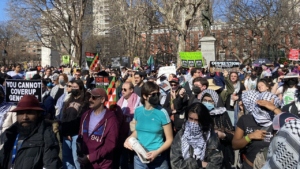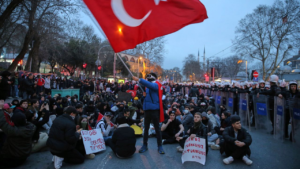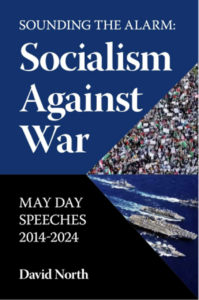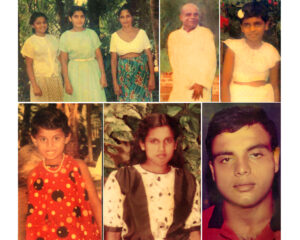Statement of the Socialist Lead of Sri Lanka and South Asia (SLLA), the Revolutionary Left Faction of the Socialist Equality Party (SEP) of Sri Lanka.
- In the Presidential Election to be held on September 21, the working class, youth, students, peasants and the oppressed middle class have no choice between any of the capitalist, right-wing and pseudo-left parties that contest the election. The only choice is their own party, the Socialist Equality Party (SEP), the Sri Lankan section of the International Committee of the Fourth International (ICFI), the World Party of Socialist Revolution, that stands alone in this election, advancing a program based on the principles of international socialism: against imperialist war, austerity and for democratic rights. A vote for SEP is an expression of approval to uphold and advance the perspective and program of the ICFI for international socialism, that can genuinely emancipate the working class from the tyranny of capital. SLLA therefore calls upon our class brothers and sisters to vote for SEP in this election.
The global capitalist crisis and its manifestation in Sri Lanka and South Asia
- The profound crisis engulfing Sri Lanka or any other country in South Asia is not an isolated phenomenon but a concentrated expression of the global breakdown of capitalism. Decades of neoliberal policies, dictated by imperialist financial institutions such as the International Monetary Fund (IMF) and willingly implemented by successive governments, have driven the working masses into an abyss of social misery. The soaring inflation, unemployment, squalid working conditions, inequality and pervasive poverty are not aberrations but the direct consequences of a global system that prioritizes profit over human need.
- The capitalist ruling elite in Sri Lanka—whether under the guise of the Sri Lanka Podujana Peramuna (SLPP), the Samagi Jana Balawegaya (SJB), or any other bourgeois formation—has no solution to this crisis. They are committed to further austerity measures, deeper cuts to essential social services, and more severe attacks on the living standards of the working people, which President Ranil Wickremasinghe has spearheaded since the suppression and betrayal of the 2022 mass uprising. These parties, regardless of their superficial differences, serve the same class interests: those of the domestic and international bourgeoisie.
- The working class in Sri Lanka, as in every other country, is trapped in a system that is both incapable of reform and unwilling to concede even the most basic social rights. It is a system that is inexorably driving humanity towards economic devastation, environmental catastrophe, and the threat of global war. The SEP alone insists that the solution lies not in patchwork reforms or the replacement of one capitalist party with another but in the revolutionary overthrow of the capitalist system itself.
The Global Escalation of US Imperialism: From Ukraine and Gaza to Asia
- The eruption of US-NATO’s war against Russia in Ukraine and the genocidal onslaught by Israel in Gaza are not isolated events but integral components of a broader strategy of global domination pursued by American imperialism. These conflicts, along with the escalating tensions in Asia, are driven by the relentless pursuit of the United States to maintain its global hegemony in the face of intensifying economic and geopolitical challenges. The working class in Sri Lanka, like workers around the world, is being dragged into this maelstrom of imperialist violence, which threatens to engulf the entire region in a catastrophic war.
- In Ukraine, the US and its NATO allies have provoked and sustained a brutal conflict aimed at weakening Russia, one of the key rivals to US dominance in Eurasia. The war in Ukraine, which has already claimed hundreds of thousands of lives, is not about defending democracy or Ukrainian sovereignty, as Washington claims, but about advancing American strategic interests by encircling and destabilizing Russia. This conflict is pushing the world toward a nuclear confrontation with incalculable consequences for humanity.
- Simultaneously, the genocidal bombardment of Gaza by Israel, fully backed and armed by the United States and other imperialist powers including Germany, is a stark expression of US imperialism’s ruthless determination to secure its dominance in the Middle East. The slaughter of Palestinians in Gaza, coupled with Washington’s unwavering support for Israeli apartheid, is a crime of historic proportions, exposing the hypocrisy and barbarism of US foreign policy. The imperialist drive in the Middle East, like in Europe and Asia, is about controlling key resources and strategic territories to bolster hegemony of the Wall Street.
- These aggressive moves are part of a broader imperialist strategy that is now rapidly expanding into Asia, where the US is building a vast military alliance aimed at encircling and confronting China. Sri Lanka, situated at a critical juncture in the Indian Ocean, finds itself increasingly caught in the crosshairs of this escalating conflict. As the US intensifies its military preparations against China, compelling its regional allies and partners to fall in line, Sri Lanka is being drawn into the vortex of war. The Colombo government’s increasing alignment with Washington, under immense economic and political pressure, threatens to transform the island into a frontline state in the impending imperialist war in Asia.
- These interconnected conflicts—whether in Ukraine, Gaza, or the Indo-Pacific—are all manifestations of the same underlying crisis of global capitalism. The working class in Sri Lanka must recognize that their struggle is inseparably linked to the struggles of the international value producing class against imperialist war. The ICFI has called for the building of a powerful international anti-war movement, led by the working class, to oppose the US-NATO war drive, defend the rights of the oppressed in Gaza, and resist the imperialist encirclement of China. Only through the revolutionary overthrow of capitalism and the establishment of socialism can the descent into global war and barbarism be stopped. Only the SEP fights for this program.
The SEP’s Revolutionary Program: For an International Socialist Strategy
- The SEP’s program is grounded in the principles of Marxism, as defended and elaborated by the ICFI. It is a program that uncompromisingly opposes all forms of nationalism, opportunism, and reformism, which seek to chain the working class to the capitalist state and its parties. The ICFI fights for the political independence of the working class, based on the understanding that the working class is the only social force capable of leading a revolutionary transformation of society.
- Central to the SEP’s program is the principle of internationalism. The global nature of the capitalist crisis demands a global solution. The SEP rejects all nationalist illusions and insists that the struggle for socialist revolution must begin in the national arena, unfold in the international arena and be completed in the world arena. This demands the building of sections of the ICFI in each country of the world. The working class in Sri Lanka must unite with their class brothers and sisters around the world in a common fight against the capitalist system.
- The SEP’s program includes:
- The Establishment of a Workers’ Government: The SEP calls for the establishment of a workers’ and peasants’ government, committed to the socialist reorganization of society. This government would expropriate the major industries, banks, and financial institutions, placing them under the democratic control of the working class.
- A Socialist Planned Economy: The SEP advocates for a planned economy based on social need, not private profit. This includes the nationalization of all major industries and resources, ensuring that the wealth produced by the working class is used to meet the needs of society as a whole.
- The Rejection of IMF Austerity: The SEP opposes all austerity measures imposed by the IMF and other imperialist financial institutions. The party demands the repudiation of all foreign debts that have been used to impoverish the masses while enriching the capitalist elite.
- Defense of Democratic Rights: The SEP fights for the defense and extension of democratic rights, including the right to strike, protest, and organize independently of the capitalist state and its political apparatus. The party also opposes all forms of ethnic and religious discrimination, recognizing that such divisions serve to weaken the working class and strengthen the ruling elite.
- Opposition to Militarism and War: The SEP unequivocally opposes the militarization of society and the drive towards war, whether in Sri Lanka, US or globally. The party stands for the dismantling of the military-industrial complex including the nuclear war-heads and the reallocation of resources to meet pressing social needs.
- Solidarity with the international working class: The SEP is committed to building a worldwide movement of the working class against capitalism. The party expresses full solidarity with the independent struggles of workers in every country, from the strikes in Europe and the United States to the mass protests across Asia, Africa, and Latin America.
- Rallying youth and students in the struggle for socialism: The SEP recognizes that youth and students are a vital force in the struggle for socialism. Under capitalism, young people face a future of unemployment, precarious work, and ever-increasing levels of debt. The capitalist system offers them nothing but a life of exploitation and insecurity. The SEP calls upon youth and students to break with the bourgeois parties and movements that seek to trap them in a dead-end of reformism and identity politics, to rally behind the working class and build ICFI’s youth-wing, the International Youth and Students for Social Equality (IYSSE).
The Bankruptcy of the NPP and FSP: No Alternative for the Working Class
- In the midst of the deepening social crisis in Sri Lanka, parties like the National People’s Power (NPP) and the Frontline Socialist Party (FSP) pose as alternatives to the established bourgeois parties. However, their history, programs and political activities reveal that these organizations are fundamentally opposed to the interests of the working class and serve only to prop up the capitalist order.
- The NPP, led by the Janatha Vimukthi Peramuna (JVP), a right-wing party of the capitalist establishment, claims to represent a “progressive” alternative to the traditional parties, yet its entire political orientation is toward the preservation of capitalism. The JVP’s program is rooted in the same nationalist and reformist outlook that has characterized its politics since its inception. The NPP offers no genuine solution to the catastrophic conditions facing the masses. It proposes mild reforms within the framework of capitalism, failing to address the systemic causes of the crisis. The NPP’s calls for anti-corruption measures and a more “efficient” capitalist state are nothing more than attempts to conceal the root causes of the bourgeois crisis and divert the growing anger of the working class into safe channels that do not threaten the existing order.
- Moreover, the NPP’s chauvinist history, including its role in supporting the communalist war against the Tamil population, exposes its inability to unite the working class across ethnic lines. Its record demonstrates that it cannot be trusted to defend the democratic rights of all workers. Instead, it seeks to foster illusions in the possibility of a “clean” and “fair” capitalist government, a delusion that only serves to disarm the working class in the face of escalating social attacks. If and when they are in power, the NPP will strengthen the capitalist oppression on the working class, in line with imperialist demands.
- The Frontline Socialist Party (FSP), which broke away from the JVP in 2012, similarly fails to provide a revolutionary alternative. While the FSP engages in more radical rhetoric and criticizes the JVP for its “betrayals”, it remains fundamentally committed to a nationalist and populist perspective. The FSP, like the NPP, advocates for reforms within the capitalist system rather than its overthrow. Its program is based on the false premise that the Sri Lankan state can be pressured to act in the interests of the working class if enough “progressive” forces are mobilized.
- The FSP’s nationalist orientation also places it in opposition to the internationalist principles that are essential for the liberation of the working class. It seeks to channel workers’ struggles into the dead-end of parliamentary politics, where they can be more easily controlled and dissipated. The FSP’s alliance with trade unions, which are deeply integrated into the state apparatus and function as tools of capitalist control, further underscores its role in maintaining the status quo.
The SEP/ICFI Perspective on the Tamil National Question
- SEP- Sri Lanka and the ICFI have a principled and historically grounded perspective on resolving the Tamil national question—one that stands in stark contrast to the bankrupt nationalism of the Tamil bourgeoisie and the chauvinism of the Sinhalese ruling elite. The SEP insists that the democratic rights of the Tamil people can only be secured through the united struggle of the entire working class in Sri Lanka—Sinhalese, Tamil, and Muslim—based on an internationalist and socialist program.
- The roots of the Tamil national question lie in the reactionary partition of British India in 1947, which left behind a series of communal conflicts and unresolved national questions across South Asia. In Sri Lanka, the Sinhala ruling elite has long exploited ethnic divisions to maintain its class rule, systematically discriminating against the Tamil minority to divert social discontent and prevent the unification of the working class. This culminated in the brutal civil war, in which successive governments waged a genocidal campaign against the Tamil population, culminating in the massacre at Mullivaikkal in 2009.
- The SEP categorically rejected the separatist perspective of the Liberation Tigers of Tamil Eelam (LTTE), which sought to establish an independent capitalist statelet in the North and East of Sri Lanka. The LTTE’s program, rooted in Tamil bourgeois nationalism, offered no solution to the oppression of the Tamil masses. Rather, it served to divide the working class and align the Tamil struggle with various imperialist powers. The LTTE’s strategy of appealing to India and imperialist powers for support was fundamentally opposed to the interests of the Tamil people and led to the organization’s eventual defeat.
- The SEP, in contrast, upholds the right of the Tamil people to the democratic right to put an end to all forms of national oppression, which is the essential progressive content of the right to national self-determination. However, the SEP insists that the realization of this right cannot be achieved through the formation of a separate capitalist state, which would simply create new forms of capitalist exploitation, class oppression and imperialist domination. Instead, the SEP fights for the unity of the Sinhalese and Tamil working classes in the struggle for the perspective of a United Socialist States of Sri Lanka and Eelam, as part of the broader fight for a Socialist Federation of South Asia and Internationally.
- This perspective is based on the understanding that the liberation of the Tamil people, like that of the Sinhalese, can only be achieved through the overthrow of capitalism and the establishment of socialism. The SEP stands for the abolition of the unitary state constitutional structure imposed by the Sri Lankan bourgeoisie on the working class of all ethnicities and for the establishment of a federation of socialist republics, which would guarantee full equality and democratic rights for all nationalities. This is inseparable from the struggle to build an international socialist movement that unites workers across South Asia and globally against imperialism and capitalism.
- The SEP’s program for resolving the Tamil national question is thus fundamentally opposed to all forms of nationalism and chauvinism. It is a perspective that recognizes that the oppression of the Tamil people is not an isolated issue but a manifestation of the broader contradictions of the capitalist system. The SEP fights to unite the working class across ethnic lines, in a common struggle for a socialist future, where the democratic rights of all peoples are fully realized. Only through the revolutionary overthrow of capitalism can the historical injustices faced by the Tamil people be rectified, and a lasting solution to the national question be achieved.
Building ICFI Sections across South Asia
- The crisis of capitalism is global, and nowhere is this more evident than in South Asia, a region plagued by deep-seated social inequality, ethnic conflicts, and the ever-present threat of imperialist war. The ruling classes across the subcontinent—from India and Pakistan to Bangladesh and Sri Lanka—have proven utterly incapable of resolving these crises. Instead, they have resorted to intensifying exploitation, whipping up nationalist and communal divisions, and suppressing the struggles of the working class. In this context, the necessity of building sections of ICFI in every country in South Asia is not merely an organizational task but a life-and-death question for the working class.
- The working class in South Asia, numbering in the hundreds of millions, is the only social force capable of leading the struggle against capitalism and imperialism. However, for this potential to be realized, the working class must be armed with a revolutionary socialist program that transcends national borders and unites workers across the region and globally. The ICFI, with its unbroken continuity of Trotskyism and its principled opposition to all forms of nationalism and opportunism, provides the necessary leadership for this historic task. The building of ICFI sections across South Asia is indispensable for educating advanced sections of the working class and mobilizing them around the perspective of permanent revolution—the understanding that the democratic and social tasks in semi-colonial countries can only be achieved through the socialist revolution, led by the working class and extending internationally.
Mobilizing the Industrial Power of the Working Class
- Central to the success of this revolutionary struggle is the mobilization of the immense industrial power of the working class through the methods of class struggle: strikes, factory occupations and general strikes. Across South Asia, workers are engaged in daily battles against brutal exploitation, wage theft, unsafe working conditions, and the dismantling of social protections. Yet, these struggles are repeatedly betrayed by the traditional trade unions, which have long been integrated into the capitalist state and function as instruments of class collaboration. These unions, tied to the ruling parties and nationalist agendas, serve to stifle and divert the militancy of the working class into dead ends, preventing any challenge to the capitalist system.
- In response, the ICFI advocates for the establishment of independent action committees, or rank-and-file committees, within every workplace and community. These committees, controlled by workers themselves, must be built outside the bureaucratic grip of the official unions. They are the means through which workers can democratically organize their struggles, link up with other sections of the working class, and prepare for the revolutionary seizure of power. These committees are not simply vehicles for economic demands but are the foundational structures of dual power, laying the groundwork for a workers’ government that would expropriate the capitalists and reorganize society along socialist lines.
Power to the Working Class: The Path Forward
- The task of these action committees extends beyond the workplace. They must become centers of political education, training workers in Marxist theory and the lessons of historical struggles, while exposing the reactionary role of all bourgeois and petty-bourgeois parties. They must also act as conduits for international solidarity, linking the struggles of workers in South Asia with those of their class brothers and sisters worldwide, particularly in the advanced capitalist countries. The International Workers’ Alliance of Rank and File Committees, established by the ICFI has undertaken this task of materializing international working class unity.
- The struggle for power must be rooted in the understanding that the working class, led by the revolutionary party, organizing its methods of struggle, is the only force capable of resolving the immense social and democratic issues facing the masses. The action committees must evolve into organs of direct workers’ power, capable of challenging the bourgeois state and establishing a workers’ government based on socialist principles.
- In every country of South Asia, the necessity of building sections of the ICFI as the revolutionary leadership of the working class and mobilizing workers through action committees is urgent. The alternative is the continued descent into barbarism—poverty, environmental catastrophe, communal bloodshed, and world war. The ICFI alone offers a way forward, and the necessary leadership, based on the principles of international socialism and the unity of the working class across all national, ethnic, and religious divisions. The ICFI section of the United States contests the upcoming presidential election, against the capitalist Democratic and Republican parties, with the same internationalist and socialist program. The future of South Asia, and indeed the world, depends on the ability of the working class to seize power and reorganize society along socialist lines.
Stand with this perspective. Vote for SEP!
Join SLLA, Build SEP!









